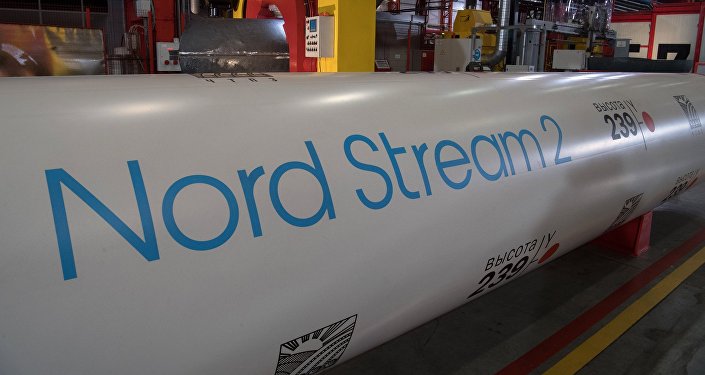Germany Responds to U.S. Decision to Sanction Russian Vessel Involved in Nord Stream 2
BERLIN (Reuters) — The United States has informed Germany that it plans to impose sanctions on a Russian pipe-laying ship involved in construction of the Russian-led Nord Stream 2 gas pipeline from Russia to Germany, the German Economy Ministry said on Monday.

"We're taking note of the announcement with regret," an Economy Ministry spokesman in Berlin said.
German business daily Handelsblatt had earlier reported the U.S. sanctions would go into effect on Tuesday as part of the Countering America's Adversaries Through Sanctions Act (CAATSA).
It said the sanctions would be imposed on the Russian pipe-laying ship "Fortuna" and its owner, KVT-RUS.
Nord Stream 2, designed to double the capacity of the existing Nord Stream undersea gas pipeline, has become a point of contention between Moscow and Washington, with the United States seeking to cut Europe's reliance on Russian energy.
The group behind the pipeline suspended work in December 2019 due to the threat of sanctions from Washington, even though the project has been nearly completed.
Germany and European allies accuse Washington of using its newly introduced CAATSA sanctions regime to meddle in their foreign and energy policies.
According to Refinitiv ship-tracking data, Fortuna is still anchored in the Baltic Sea near Rostock in Northern Germany.
A spokesman for the U.S. embassy in Berlin told Handelsblatt that Washington would continue to take "all necessary and appropriate steps" to prevent Nord Stream 2.
"Although we do not comment on future sanctions measures, we will continue to exchange ideas with allies and partners on potential sanctions issues," the spokesman said.
The U.S. government is hoping that Germany will reconsider its position on Nord Stream 2, he added.
The U.S. State Department and the Treasury Department in Washington did not immediately respond to requests for comment.
A German government spokesman had told reporters earlier on Monday that Berlin's view on the pipeline remained unchanged, namely that Nord Stream 2 was a private sector project.
Russia's state-owned gas giant Gazprom is implementing the project jointly with Western partners Uniper, Wintershall, Engie, OMV and Shell.
U.S. President-Elect Joe Biden has opposed Nord Stream 2 in the past, but it is unclear if he could compromise on the issue after taking office on Wednesday.
Handelsblatt cited a Nord Stream 2 spokesman as saying that it was up to the European Union and governments in the countries involved to protect companies from any sanctions.
Gazprom declined to comment and Nord Stream 2 was not immediately available for comment. KVT-RUS could not be reached for comment.
Also on Monday, environmental activist group Nabu said it had filed a complaint with the German maritime authority, BSH, to temporarily halt construction work of the Nord Stream 2 gas pipeline in German waters.
The complaint against BSH's move on Friday to expand the period during which construction work can theoretically take place automatically halts any work on the project, BSH confirmed.
Focus earlier reported that two environmental groups, Nabu and DUH, had filed complaints and that this was effectively a freeze on construction work.
Related News
Related News

- 1,000-Mile Pipeline Exit Plan by Hope Gas Alarms West Virginia Producers
- Valero Plans to Shut California Refinery, Takes $1.1 Billion Hit
- Three Killed, Two Injured in Accident at LNG Construction Site in Texas
- Boardwalk’s Texas Gas Launches Open Season for 2 Bcf/d Marcellus-to-Louisiana Pipeline Expansion
- Traverse Pipeline Approved to Move 1.75 Bcf/d of Gas Along 160-Mile South Texas–Katy Route
- New Alternatives for Noise Reduction in Gas Pipelines
- Construction Begins on Ghana's $12 Billion Petroleum Hub, But Not Without Doubts
- DOE Considers Cutting Over $1.2 Billion in Carbon Capture Project Funding
- Valero Plans to Shut California Refinery, Takes $1.1 Billion Hit
- Newsom Seeks to Aid Struggling Refiners Following Valero’s California Exit




Comments